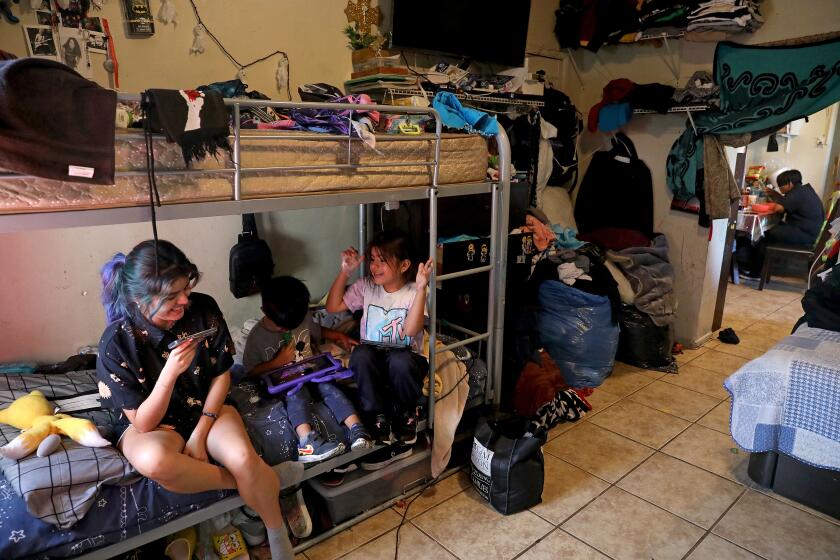The foreclosure bargain hunt
IF regular real estate deals are a two-aspirin headache, then foreclosure purchases are a serious migraine.
Despite the reported upswing in foreclosures, it actually is not easy to find them. Nor, once you locate one to buy, is the purchase process simple. Even if done right, it can take a while to find and buy a bank-owned property. And the process is fraught with pitfalls.
“The search process is impossible,” said Michael Davin, co-founder of Catalist Homes, which offers a Web-based service that helps buyers hunt for bank-owned properties in some Southern California communities. “It’s taken me a year to figure it out.” And he’s an expert.
Foreclosures are plentiful -- in October alone, banks repossessed 5,803 homes in six Southland counties, up from 753 during the same period a year ago, according to DataQuick Information Systems.
But it would be hard to tell by driving down the street -- banks typically don’t trumpet that status on frontyard for-sale signs.
In a perfect world, there would be one master list of all foreclosure sales, a computer click away. But this isn’t a perfect world.
Foreclosure seekers must rely on bank lists, the Multiple Listing Service, tax records and websites, according to experts who search daily for such sales. “You can Google and maneuver websites all day, but it’s not easy to get what you want,” said Scott Chapman, a Long Beach agent and foreclosure specialist.
Some buyers are going directly to banks. Big lenders, such as Bank of America, Wells Fargo and Washington Mutual, sometimes let customers peruse their lists of foreclosed properties at local branches. It’s prudent to check with them by phone first to see if they allow drop-ins.
But even if buyers find their dream homes on such a list, the lenders won’t talk directly to them; banks hire real estate agents to market and sell the properties for them, said Los Angeles mortgage broker Mitchell Ohlbaum.
Some bank websites list foreclosed properties, but often the data are 30 to 45 days old, said Bill Nazur, coauthor of “Finding Foreclosures: An Insider’s Guide to Cashing In On This Market.” For a well-priced property in decent condition, that could be too late.
The websites usually refer customers to the banks’ asset managers -- typically realty brokers in charge of repairing and selling the distressed properties -- but, Nazur said, “95% of the time, they don’t reply to buyers, because the buyers’ documents aren’t in order. So they’re on to the next customer.” Foreclosure properties can sell quickly, some after multiple offers, so buyers must show solid proof of loan approval from their lenders.
Online resources
As foreclosures have proliferated, so have Internet sites offering a host of services to help buyers find those properties -- nearly all for a fee. Some sites charge up to hundreds of dollars for lists and other help that’s available for free from banks and public records.
Two of the more comprehensive and well-trafficked websites, www.realtytrac.com and www.foreclosures.com, provide lists of homes in default and in foreclosure and information on how to buy bank-owned properties. The fees are about $50 per month.
RealtyTrac has links for customers to check neighborhood “comparables” -- the prices of similar recently sold homes. Comparables are available from real estate agents for free. Buyers who do these searches themselves, however, must devote a great deal of time to the process.
RealtyTrac customers are offered seven days’ free service, but they must give their credit card information to get it and remember to cancel the subscription within seven days or a paid subscription will kick in.
Bank-owned listings can be found on agents’ personal websites and the MLS, the broker-controlled database that combines listings of all available properties represented by real estate brokers. But agents say the MLS site is difficult to navigate. The Realtor.com site includes foreclosed properties, but they’re mixed in among other listings. Hermosa Beach-based Catalist Homes’ website -- www.catalisthomes.com -- filters out pre-foreclosures; its list has only those properties for sale that are bank-owned, not those in the default stage, which often never reach the market. When properties are sold, Catalist flags the listings as such. The service is free.
The easiest way to find foreclosed properties, experts say, is through real estate agents who specialize in those sales. They’ve done the research, saving buyers the trouble.
Even after finding a property, the purchase process can be a bumpy ride for novices.
Some buyers attempt to purchase homes whose loans are in default, the first stage of the foreclosure process. Notices of default are recorded at county recorders’ offices. But just because an owner is in default doesn’t mean the house is for sale.
Often, it isn’t, because the owner has three months to make the back payments before losing the home. Understandably, some owners are less than thrilled to receive letters or calls from circling buyers.
Those bent on purchasing homes that have notices of default should keep tabs on the properties, to find out if and when they are foreclosed on by the banks. But don’t pin all your hopes on one property, experts say -- keep track of several to avoid disappointment. Buyers also are advised to see if the homes have builder liens and back taxes owed -- for which a buyer becomes liable -- and should find out what the neighborhood comparables are.
To find out if there are liens against a property within Los Angeles County, the prospective buyer must get the owner’s name from the county assessor’s office (you must have the address to do that), then search the property’s history on microfilm at the Los Angeles County registrar-recorder/county clerk’s office in Norwalk. This information is not available at the county’s website.
“Default deals require tons of homework on the buyer’s part,” author Nazur said. “But sometimes you can get bargains” if the timing is just right.
Next step: auction
If the owner in default does not meet payments on time, the trustee -- a third party, most often a title company -- sets a date for a public auction. By long-standing custom, auctions are held outside courthouses to provide public access for everyone and to allow buyers the chance to check the public records before bidding begins.
Title companies and other trustees hire auctioneers to run the sales; they are not run by the counties. The dates and times of these sales must be published in a local newspaper once a week for three weeks.
Auctions aren’t for the faint of heart, however, and can result in big losses for the inexperienced, said John Ratzlaff, a Whittier agent. Trustees hire professional auctioneers to run the sales, which unfold quickly, and the uninitiated can get caught up in the excitement and overbid. Buyers must bring cashier’s checks in amounts matching at least the minimum bids. Experienced buyers bring more than one check.
Experts recommend that buyers conduct a search to make sure the title to the property is clear before a courthouse auction. Title companies provide that service for about $360 for residential properties. Also, as with default purchases, it’s important, they say, to find out whether the properties have tax liens and multiple mortgages and how much the homes they’re bidding on are worth.
Owners of bank-owned properties -- or their tenants -- may still be living there, so the new owners must be prepared to evict them. The houses may be in ramshackle condition, requiring a great deal of work. Prospective buyers may hire an inspector to check out the property -- stem to stern -- before the auction.
“You can get a property way below market value but then have to spend money to bring it up to market value,” said Christian Stevens, a Brentwood Keller Williams agent and foreclosure expert who has closed 60 foreclosures in L.A. County this year. “You must be astute to get a true deal.”
But banks, at this stage of the market downturn, aren’t too eager to make deals, said Mike Novak-Smith, a Re/Max agent in Moreno Valley.
“Banks aren’t in business to lose money,” Novak-Smith said. “They set the price without emotion, based on current market data and appraisals.”
Lenders have another motivation to sell the homes at market value too.
“Banks have other borrowers in the same neighborhoods and don’t want them negatively impacted by values plummeting,” said Geoff McIntosh, broker and co-owner of Main Street Realtors in Long Beach, who has handled hundreds of foreclosure deals.
Buyer beware
David Vega, a 29-year-old Covina real estate agent, recently attended a private auction staged at a hotel by a large national firm to buy a property for a client. He got caught up in the excitement and ended up buying, sight unseen, a house in Fontana for his fiancée, Monica Garcia, 26, her daughter, Jaclyne, 6, and himself. It was Vega’s first auction, and he found it “very intimidating,” he said.
As is true of most auction purchases, the home he bought was sold as is -- which is why experts strongly recommend that buyers thoroughly check out the properties they’re interested in before the first bid is called. He got the five-bedroom house in 3,698 square feet for $420,000, plus he paid a 5% fee to the auction company.
Vega was lucky: The Fontana house, built in 2004, is in “excellent condition,” just needing a good cleaning, he said. It was appraised at $600,000, he added. His client’s house, however, purchased for $467,000, is “hideous. All the doorknobs are off, and the rooms are trashed.”
“If you go into an auction without seeing the house, it can have cracked foundations, bad plumbing, termites,” Nazur said. “It can be a financial disaster. Have it inspected, and get an appraisal first.”
Dwayne Hidalgo was more meticulous about his bank-owned purchase. The 47-year-old general contractor had his Whittier agent, Laura Reyes, help him find a foreclosed home he and his father, Ernest, 75, could fix and flip. Reyes spent three months checking the MLS for such properties before finding the Norwalk fixer the Hidalgos bought for $424,000. It was listed for $439,000.
Before approving the contractor’s loan, Dwayne Hidalgo’s lender required that the bank selling the house pay to bring the property up to code, including graffiti removal and window replacements. The bank agreed. The Hidalgos have gutted the kitchen and bathroom and are restoring the converted garage, which was trashed by the previous owners and vandals. They’re installing a dishwasher and stove, microwave and other appliances.
“We did the math first to make sure that we would still make money after fixing up this place,” Dwayne Hidalgo said.






